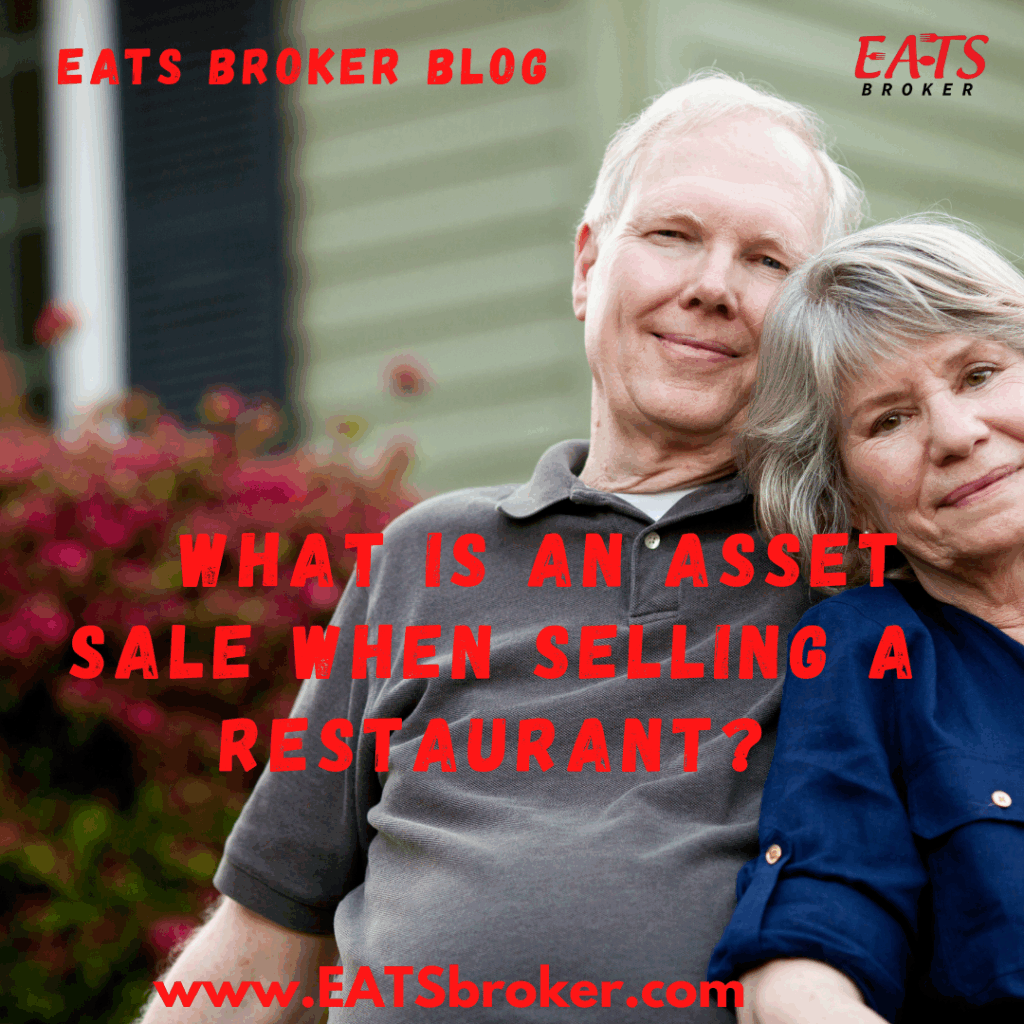What is an Asset Sale? This is a common question for a Restaurant Broker when providing restaurant valuations or phone consultations to restaurant owners. Restaurant owners
At EATS Broker, we specialize in helping restaurant owners exit their businesses smoothly, whether the restaurant is profitable or struggling. Restaurant Brokers bring value to a transaction because they understand the difference between the challenges of selling a restaurant as profitable and an asset sale.
The Dallas Restaurant Broker Dominique Maddox says, “restaurant resale specialists explain to restaurant owners how an asset sale works, what to expect, how to prepare, and how to get the most money when exiting a restaurant”.
Three restaurant valuation methods are commonly used at Restaurant Brokerage Firms they are:
Gross Revenue Approach– a method commonly used by non-restaurant Brokers and restaurant owners.
Income Approach—This method helps the buyer understand earnings before interest, tax, depreciation, and amortization (EBITDA), which measures a company’s operating performance. Bank lenders prefer this method to qualify a business for lending and net the highest sales price.
Asset-Based Approach (Asset Sale)—This is also known as the replacement method. The buyer purchases specific assets of the restaurant, including furniture, fixtures, equipment, goodwill, leasehold rights, recipes, and, in some cases, a liquor license. The buyer does not automatically assume all the business’s liabilities. This is why most restaurant transactions are structured as asset sales: buyers get a fresh start, while sellers can exit without dragging buyers into old obligations.
Why Restaurant Brokers Use Asset Purchase Transactions:
For restaurant owners, an asset sale is often the cleanest and fastest way to sell. Here’s why it’s common in the restaurant industry:
- Buyers prefer it – They avoid inheriting past liabilities or lawsuits.
- Clear breakdown of assets – Buyers know precisely what they’re purchasing.
- Tax advantages for buyers – They can “step up” the value of depreciable assets.
- Flexibility with leases – Landlords often require lease assignments, which are easier to negotiate in asset sales.
- Liquor license transfers – These can be handled as part of the asset package, though they require careful compliance with state/local laws.
Key Considerations for Sellers
While asset sales are popular, they come with unique requirements that restaurant owners must prepare for:
1. Gathering Documentation
Before listing, sellers should provide:
- 2–3 years of Profit & Loss Statements and Tax Returns
- A copy of the lease and any franchise agreements
- An updated equipment list (only items that are owned and not leased)
- Copy of Franchise Disclosure Document (FDD)
- Copy of Bank payoff amount
2. Understanding Taxes
In an asset sale, different assets are taxed differently. For example:
- Goodwill (intangible value of your brand, reputation, and customer base) is taxed at capital gains rates.
- Hard assets (equipment, furniture) may trigger ordinary income taxes due to depreciation recapture.
- Buyers and sellers must file IRS Form 8594 to report how the purchase price is allocated across asset classes.
3. Closing Costs & Liabilities
Expect additional costs such as escrow fees, franchise transfer fees, and liquor license transfer costs. Sellers should also plan for the release of personal guarantees tied to leases or vendor contracts—a significant benefit of completing the transaction.
Benefits of an Asset Sale for Sellers
Even if your restaurant isn’t profitable, it still has value in an asset sale. Buyers often seek:
- Turnkey infrastructure (kitchen build-out, furniture, fixtures)
- Prime location and lease rights
- Existing liquor licenses (in high demand and heavily regulated)
For sellers, the benefits include:
- Relief from long-term lease obligations and personal guarantees
- The ability to stop ongoing cash flow losses
- Liquidity to pay off debt and move on to new opportunities
Final Thoughts: Why Work with a Restaurant Broker?
An asset sale may sound straightforward, but it involves complex negotiations, tax implications, and regulatory compliance. Professional guidance is essential for structuring the Asset Purchase Agreement, navigating liquor license transfers, and ensuring clean lease assignments.
At EATS Broker, we’ve helped countless restaurant owners exit successfully through asset sales. Whether your restaurant is thriving or struggling, you have options—and we’re here to guide you every step of the way.
Are you thinking of selling your restaurant? Let’s discuss your options in a confidential, no-obligation consultation. Call EATS Broker at 404-993-4448 or visit www.EATSbroker.com to schedule your free restaurant valuation today.

